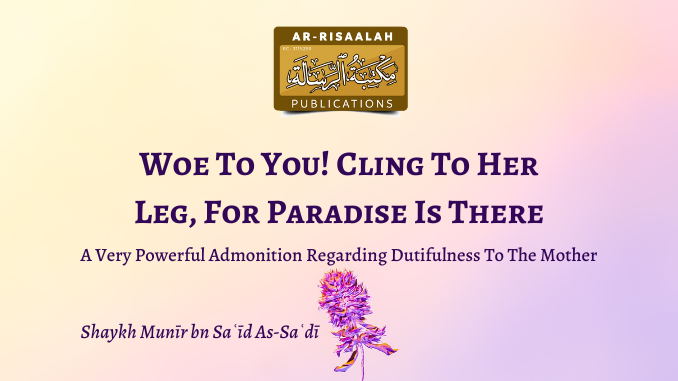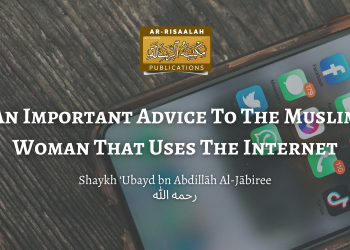(A Very Powerful Admonition Regarding Dutifulness To The Mother)
Woe to you! Cling to her leg [i.e., serve her], for Paradise is there.
The mother! That woman, whom the speech is pleasant with mentioning her. And the soul is delighted upon meeting her. And the heart is sad upon her departure. And the eye tears up due to her absence.
That woman, whose lap is the softest pillow on the face of the Earth.
That woman, who is a fountain for affection, love, mercy, and benevolence—a fountain that doesn’t run out or dry, as long as she still breathes.
That woman, who is a factory for the nation.
The mother is a school; if you prepare her well # you have prepared a nation of noble lineages.
The mother, that woman whom Allāh said regarding:
﴾His mother bore him in weakness and hardship upon weakness and hardship, and his weaning is in two years give thanks to Me and to your parents, unto Me is the final destination.﴿ [Luqmān: 14]
And He said regarding her:
﴾His mother bears him with hardship and she brings him forth with hardship, and the bearing of him, and the weaning of him is thirty (30) months.﴿ [Al-Aḥqāf: 15]
She endured hardships, difficulties, and pains, since she got pregnant until the end of her life. She made sacrifices for her children and she preferred them over herself.
Their happiness is her happiness and their sadness is her sadness. She tires herself for them and she keeps awake for their comfort.
Due to this, she is the person most deserving of companionship. How will dutifulness to the mother not be among the most beloved of deeds to Allāh while Paradise is beneath her leg?!
In the Musnad of Imām Aḥmad, may Allāh have mercy on him, a man came to the Prophet ﷺ to seek his permission to fight [in the cause of Allāh] alongside him. So, the Prophet ﷺ ordered him to return to his mother and be dutiful to her.
So, he [i.e., this man] repeated his request. So, he [i.e., the Prophet], may Allāh extol his mention and grant him peace, said:
“Woe to you! Cling to her leg [i.e., serve her], for Paradise is there.”
And the Prophet ﷺ had mentioned that man who used to give his parents milk and he does not give precedence to anyone over them—not his wife or child.
So, he came to give them the milk that night, but he found both of them already asleep. So, he waited until dawn. Then, they woke up, and he gave them the milk.
And this is Muḥammad bn Al-Munkadir, may Allāh have mercy on him. He places his cheek on the floor and tells his mother: “Place your foot on my cheek.”
Woe to you! Cling to her leg, for Paradise is there.
And this is Saʿīd bn ʿĀmir, may Allāh have mercy on him. He said: My brother spent the night praying while I spent the night massaging my mother’s foot. And I do not desire to exchange my night with his night.
He meant, his massaging his mother’s leg is more beloved to him than the night prayer.
Woe to you! Cling to her leg, for Paradise is there.
And this is Ṭalq bn Ḥabīb, may Allāh have mercy on him. He used to kiss his mother’s head, and he does not climb a roof while his mother is beneath it—in veneration of her.
And a man said to Al-Ḥasan Al-Baṣrī, may Allāh have mercy on him: “I performed [supererogatory] Ḥajj with my mother’s permission.”
And perhaps, Al-Ḥasan understood from this that this man persistently urged his mother [to permit him] to perform a supererogatory Ḥajj, and after his persistence, she permitted him.
So, Al-Ḥasan, may Allāh have mercy on him, said: “Indeed, a single sitting that you sit with her on her dining table is more beloved to me than your [supererogatory] Ḥajj.”
And this is Ḥaywah bn Shurayḥ, one of the scholars of Ḥadīth. He used to conduct a sitting of Ḥadīth, and there would be numerous students around him.
And his mother would summon him: “O Ḥaywah! Rise and give barley to the hens.” That is, rise and feed the hens. And he would stand. May Allāh have mercy on him.
He would not refrain, be arrogant, refuse, or be annoyed.
This is a woman asking [a question]. She says: I apply cream to my mother’s leg then I wash my hands. Is this from undutifulness [to her]?
[That is,] for me to wash my hands from her leg while the Prophet ﷺ says: “Cling to her leg, for Paradise is there.”
A strange question from this woman who is dutiful to her mother.
And this is another woman saying: I inject my mother with insulin and I notice distress and pain in her face. Is this from undutifulness—even though I’m obliged to administer this injection to her?
Strange questions that only come from people that dutifulness has led them to a great point.
The one who falls short in being dutiful to his mother might find this strange and be baffled by these scenarios.
O slave of Allāh! O you who has fallen short in being dutiful to his mother! Remember a night in which you would wake up, and lo, you had lost your mother.
Remember the time when you would enter the house in which your mother used to live but you would not hear her voice.
Remember that moment in which you would not see her figure and you would not see her clothes.
Remember, O you who falls short [regarding your mother], the day you would be pouring sand on her grave and receiving condolences!
Remember! Perhaps, you would awake from your shortcoming regarding your mother.
And if not [i.e., if that is not enough], then ask that one who has lost his mother about what has become of his life.
And how the taste of life has changed after her death.
Ask him about the kind of good he has been deprived of and the kind of door that was shut on his face!
Perhaps, you would awake from your shortcoming.
Ask that one that lost his mother and has left her at the graveyard about what he has lost.
He lost a great support. He lost the one who used to pray for him. Many prayers. Great prayers. Every single time.
At that point, you would realize the importance of your mother. At that point, you would realize her status.
Perhaps, that would lead you to return and please her.
Return, O slave of Allāh! O you who falls short regarding his mother, return and please her. And rectify what has passed! And rectify what is left!
And if she has passed away, give charity on her behalf, set up a waqf (endowment) for her—if you’re capable of that.
Perform Ḥajj and ʿUmrah on her behalf—especially if she did not perform Ḥajj or ʿUmrah [during her lifetime].
Be dutiful to her sister—if she has a sister. The aunt takes the position of the mother.
And pray for her. Pray for your mother with much prayer. In your obligatory and supererogatory [Ṣalāh]. While on a journey and at home. Pray for her at night, during the day, and the times when prayer is accepted.
﴾Say: “My Lord! Bestow on them Your Mercy as they did bring me up when I was small.”﴿ [Al-Isrāʾ: 24]











